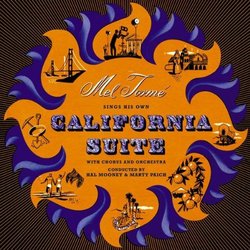| All Artists: Mel Torme Title: Sings His Own California Suite Members Wishing: 0 Total Copies: 0 Label: Fresh Sounds Spain Original Release Date: 1/1/2008 Re-Release Date: 11/30/2008 Genres: Jazz, Pop, Broadway & Vocalists Styles: Swing Jazz, Traditional Jazz & Ragtime, Vocal Jazz, Easy Listening, Oldies, Vocal Pop, Traditional Vocal Pop Number of Discs: 1 SwapaCD Credits: 1 UPC: 8427328604963 |
Search - Mel Torme :: Sings His Own California Suite
 | Mel Torme Sings His Own California Suite Genres: Jazz, Pop, Broadway & Vocalists For the first time on one CD, the two CALIFORNIA SUITE versions as recorded by Mel Tormé with the orchestras conducted by Hal Mooney (Capitol, 1949) and Marty Paich (Bethlehem, 1957). An historic musical event, reissu... more » |
Larger Image |
CD Details
Synopsis
Product Description
For the first time on one CD, the two CALIFORNIA SUITE versions as recorded by Mel Tormé with the orchestras conducted by Hal Mooney (Capitol, 1949) and Marty Paich (Bethlehem, 1957). An historic musical event, reissued in a very special package, including two different and comprehensive booklets full of memorabilia, photos and lyrics.
"California Suite" was originally a 30-minute lyrical and musical narrative composed and dedicated by Mel Tormé to the Golden State. Mel spent six months writing the piece, which was recorded in 1949 by Capitol Records, and released the following year with notable critical acclaim, albeit with some qualifications about its cohesiveness and clarity. Encouraged by fans and musicians to revisit the concept, eight years later he recorded, this time for Bethlehem, a revitalized, extended version arranged and conducted by Marty Paich, with much more jazz influence than was evident in the original recording. Some stereotypical touches remained, but Paich's real genius exploded like a bombshell in the studios.
This is the first time both versions have been compiled in an individual set. It is proof of Tormé's many-faceted ability as a singer and composer, and it also confirmed Paich's pre-eminence as a progressive arranger among his contemporaries.
"California Suite" was originally a 30-minute lyrical and musical narrative composed and dedicated by Mel Tormé to the Golden State. Mel spent six months writing the piece, which was recorded in 1949 by Capitol Records, and released the following year with notable critical acclaim, albeit with some qualifications about its cohesiveness and clarity. Encouraged by fans and musicians to revisit the concept, eight years later he recorded, this time for Bethlehem, a revitalized, extended version arranged and conducted by Marty Paich, with much more jazz influence than was evident in the original recording. Some stereotypical touches remained, but Paich's real genius exploded like a bombshell in the studios.
This is the first time both versions have been compiled in an individual set. It is proof of Tormé's many-faceted ability as a singer and composer, and it also confirmed Paich's pre-eminence as a progressive arranger among his contemporaries.
